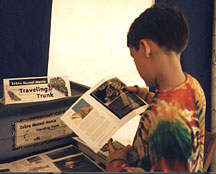 |
|||||||||
skip to content |
|||||||||

Invasive Species in the Classroom
Illinois-Indiana Sea Grant
Makes Strides with New Resources
While endangered species get their share of coverage in the press and their plight is addressed by classroom teachers from prechool on up, nonindigenous species and their ecological, environmental and economic aspects are less commonly featured.
The Problem…
The zebra mussel, round goby, purple loosestrife, and fishhook flea are not endangered species. In fact, they are quite the opposite; they are examples of invasive species--sometimes called exotic aquatics or aquatic nuisance species. They don't belong. They are invaders which have been inadvertently introduced into bodies of water and wetland areas--causing major problems for water-dependent industries, such as sportfishing, water treatment plants, and power companies. These unwelcome newcomers are also damaging our local ecosystems. The Great Lakes are teeming with them. They glob up fishing lines, clog motors and disrupt the food chain. Many of them have few known predators so they multiply and continue to cause problems in their new environments.
 The tiny but prolific fishhook flea-Lake Michigan's newest invader- has few predators and could be a serious threat to yellow perch. |
Unlike treasured endangered species, invasive species do not get a lot of press. They are not embraced by special interest groups, and until recently, teachers have not incorporated this topic into their curriculum. The public doesn't realize just how much they are affected by the introduction of these new species. And, even more importantly, people don't know that they can play an important role in reducing the spread of some of these invaders.
Even though a substantial amount of research is underway to find ways to control invasive species, there has not been a ready supply of educational materials available to the general public and to teachers. Illinois-Indiana Sea Grant has developed numerous education resources to fill this gap. Its staff members are working closely with the research and education community to infuse the classroom curriculum with science-based, multi-disciplinary interactive lessons. The Program hopes it will permeate the classroom curricula as successfully as these invaders have infiltrated the Great Lakes.
Education...
Illinois-Indiana Sea Grant is changing the low profile of invasive species by letting people know how they can help reduce their spread. Some highly effective methods to share information about invasive species with the adult public include distributing break-throughs in research to the news media, informative Web-sites, displays at trade shows, and other large public venues.
 |
Patrice Charlebois, Sea Grant Biological Resource Specialist, demonstrates how power spraying your boat can effectively remove zebra mussels-both adults and tiny veligers--from nooks and crannies. Boaters at the Chicagoland Fishing, Travel, and Outdoors Show learned how they could be part of the solution in preventing spread. |
But the classroom must not be overlooked. It is filled with future scientists and future decision-making citizens who need to be informed about what's going on in their lakes and rivers. It is important for students to understand the significance of these changing ecosystems.
One way to educate the next generation is to provide educational workshops and materials to teachers so that they can bring their new-found knowledge and understanding of invasive species to their students. After all, if teachers don't understand the problems or have creative instructional tools, how can they be expected to share it with their students?
Illinois-Indiana Sea Grant funds cutting-edge research projects which study invasive species, ways to learn how to prevent future introductions, and which arrive at solutions to the problems they bring. For example, David Lodge, University of Notre Dame, is studying the characteristics of the environment and the invaders to determine the factors that increase the likelihood of invasion of aquatic exotic species. His research will help management agencies be better prepared to prevent future introductions.
But it takes a long time for research findings to get all the way to a hard-bound science textbooks which are expensive for schools to purchase and may only get updated once in a decade. In the meantime, teachers need timely, accurate information and materials for their classroom about invasive species.
Three K-12 Solutions…
Zebra Mussel Mania Traveling Trunk
Since 1995 teachers have selected from a smorgasbord of activities that best satisfied their classroom palate. The Zebra Mussel Mania Traveling Trunk was developed by Illinois-Indiana Sea Grant to help teachers add units about invasive species, especially zebra mussels, to their curriculum. The information in this hands-on resource was based on research findings from Sea Grant and other partnering agencies. The traveling trunk is designed for use in grades 3-8. It has also been used at the high school level and includes a series of ten hands-on experiments, stories, and games. The curriculum offers vivid examples to students of just what the zebra mussel invasion means on a practical level.
  |
|
Young students visiting the University of Illinois and Purdue University try out the Traveling Trunk's "Mussel to Mussel" and "All Clogged Up" activities. By observing and experimenting, they learn how zebra mussels affect native mussel populations and how industrial water pipes are being clogged by the nuisance zebra mussels. |
This curriculum, developed in conjunction with the Illinois Rivers Project, provides teachers with materials and activities that integrate math, language arts, and fine arts studies with the scientific and environmental lessons. Activities were developed by teachers for teachers, which ensures classroom-friendly lessons.
The "trunk" arrives with all the equipment needed to carry out its activities, plus a portfolio of extra resource materials on zebra mussels and other aquatic nuisance species. Four videos on zebra mussels teach students about biology, spread, impact, and control methods. Sea Grant has set up a lending network of 35 centers around the U.S. and Canada to make it easy for teachers to borrow this award-winning resource.
Teachers Meet Up With "Intruders" at Camp
|
Exotic Species Day Camp is an enjoyable way for teachers to learn about invasive species through hands-on experiences. The camps were held in 1998-99 in a variety of Great Lakes states and were led by Sea Grant education and outreach specialists. Teachers came together to learn about invasive species, then created their own activities which they now use in their own classrooms. The collection of these lesson plans will be used by teachers throughout the Great Lakes region to create a well rounded set of lessons, called ESCAPE, which will be distributed by Illinois-Indiana Sea Grant and used in classrooms everywhere. The teachers who attended these "day camps" have trained other teachers to use the materials and to teach their students about invasive species.
Invasive Species Around the Globe
 One would think that the appropriate venue in which to teach about invasive plant and animal species would be the Science classroom. But since these creatures travel via waterways and they pick their locations based on a variety of water and temperature conditions, another logical and creative place to teach and learn about them is in Geography and Social Studies classrooms. That's the idea behind a new education program called Exotic Aquatics on the Move. It is a national project being developed to address the needs of geography and social studies teachers and their students.
One would think that the appropriate venue in which to teach about invasive plant and animal species would be the Science classroom. But since these creatures travel via waterways and they pick their locations based on a variety of water and temperature conditions, another logical and creative place to teach and learn about them is in Geography and Social Studies classrooms. That's the idea behind a new education program called Exotic Aquatics on the Move. It is a national project being developed to address the needs of geography and social studies teachers and their students.
Teachers in grades 6-12 will learn about exotic aquatic species by exploring five themes: origin, distribution, movement, consequences, and solutions. These themes will provide an understanding of the invaders' impacts on the ecosystem and economy, especially those species threatening our lakes and inland waters. Workshop content will draw extensively from results of Sea Grant sponsored research.
 Classrooms are now using the Internet as an integral teaching strategy. The Web is a strong component of this project providing helpful visuals and background information aimed at generating discussion among teachers and students around the world. The new Web site, along with the workshops and other materials generated from them will be yet another way to educate teachers and students about the spread and impact of invasive species.
Classrooms are now using the Internet as an integral teaching strategy. The Web is a strong component of this project providing helpful visuals and background information aimed at generating discussion among teachers and students around the world. The new Web site, along with the workshops and other materials generated from them will be yet another way to educate teachers and students about the spread and impact of invasive species.
Maps found on the SGNIS Web site, along with other maps that show range and distribution will serve as important tools to illustrate species movement from region to region. The SGNIS Kid's Site is a fun way to engage students in the study of invasive species.
Teachers Find Invaders a Helpful Addition to the Classroom
Illinois-Indiana Sea Grant's work in research and outreach has provided the foundation to develop quality programs for teachers. They appreciate the hands-on, multi-disciplinary activities that directly relate to state learning goals. Over 1,000 teachers and 25,000 students have learned about the biology, spread, and impact of many invasive aquatic species through Zebra Mussel Mania. An additional 18,000 students now have the information necessary to make responsible decisions about how to reduce the spread of these species, as a result of the series of Exotic Species Day Camps.
It is the hope of Illinois-Indiana Sea Grant that the topic of invasive species will be given as much class time as endangered species. And, hopefully, in the future, more students will create research projects, dioramas, maps, and skits depicting local ecosystems; showing how aquatic invaders have affected the natural system; and describing how people can help find solutions to this problem.
|
The Illinois-Indiana Sea Grant College Program supports research, education, and outreach that fosters the creation and stewardship of an enhanced and sustainable environment and economy along southern Lake Michigan and in the Great Lakes region. The Program enhances the quality of life for citizens in the bi-state area and the Great Lakes region through its focus on aquaculture, biological resources, coastal business and environment, and water quality. The Illinois-Indiana Sea Grant is one of 29 programs in the National Sea Grant College Program created by Congress in 1966 to address marine and Great Lakes needs to enhance sustainable coastal development. Sea Grant is a partnership of academia, government, business and industry. Funding is provided by the National Oceanic and Atmospheric Administration, U.S. Department of Commerce; Purdue University; and the University of Illinois at Urbana-Champaign. |
[4/7/00]
CLIMATE · OCEANS, GREAT LAKES, and COASTS · WEATHER
and AIR QUALITY
ABOUT US · RESEARCH
PROGRAMS · EDUCATION · HOME


